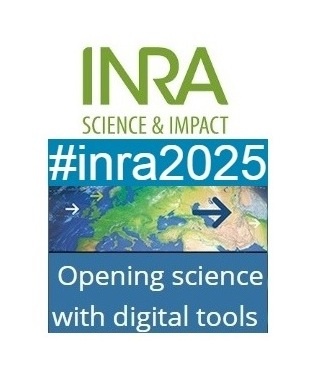INRA2025 : Open Science priority, Data sharing and much more


The French National Institute for Agricultural Research INRA mobilises a broad spectrum of cognitive research, from biology and fundamental ecology to applications in agriculture, nutrition and the environment. INRA has established its orientations (incuding Open Science vision) for the next ten years.
__________________________________________________________________________________________________
"France actively participates in the development of European and global Open Science data policies", - France - Open science country note.
“By committing to Open Science, we want to foster innovation and tackle the crucial agricultural, nutritional, and environmental challenges that society is facing. This involves making our data available and reusable, as well as making it possible to access data produced by others… Thanks to our work with GODAN, we have strengthened our collaborations that promote open access, namely those with the FAO and other research institutes like the WUR in the Netherlands and the CSIRO in Australia. Two European-level projects have arisen from these collaborations. They are slated to start in early 2017 and involve the FAO along with several other European countries. They are: e-Rosa, headed by INRA, which will establish a roadmap for building a digital infrastructure for agricultural data (duration of 18 months) agINFRA+, led by Greece; INRA (i.e., MISTEA Joint Research Unit) will be in charge of a subproject focused on big data and plant phenotyping (duration of 3 years)" |
Stabilise global warming, reduce food insecurity, ensure energy transitions, construct agricultural systems for the future, prepare Open Science and Big Data… agricultural research will be confronted throughout the 21st century with unprecedented challenges.
In this context, INRA has decided to update its strategic orientations through to 2025 which has been driven by the priorities of the national research strategy, Sustainable Development Goals (SDGs), recent external evaluations of the Institute, and the last self-assessment report issued by INRA and the collective thinking of its management bodies.
These orientations for 2016-2025 (see: Document d'orientation #INRA2025) are structured as follows:
Three general policy directions:
#OpenScience
INRA’s commitment to the dynamic initiated by the digital revolution, which is transforming our research issues, methods and practices;
#OpenINRA
Pursuit of INRA’s openness to its academic, industrial and public partners, from the local to the global scale, including non-market actors through citizen science approaches;
#Support
Changes to the organisation of INRA and its practices in order to achieve its objectives.
Five priority thematic areas are the following:
#Global
A global ambition to achieve food security in a context of planetary transitions and changes;
#3Perf
The economic, environmental, health and social performance and diversity of French agriculture, enhanced by agroecology and digital farming approaches;
#Climate
The adaptation of agricultural and forestry systems to climate change, the attenuation of their effects on the climate and the ecosystem services they can offer, so as to contribute to con-trolling greenhouse gas emissions;
#Food
The development of healthy and sustainable food systems;
#BioRes
The complementarity and competing uses of bioresources to meet food needs in the first instance, and also those for energy, chemistry and biosourced materials.
The whole programme is broken down into goals that clarify these orientations. In particular, INRA's #OpenScience with digital tools vision is:
- broken into the following five objectives:
# OpenScience-1: Interconnected research infrastructures
# OpenScience-2: Data organisation for sharing and reuse
# OpenScience-3: Predictive approaches in biology
# OpenScience-4: Novel means of knowledge dissemination
# OpenScience-5: Evolving research professions and environments in a digital world
- in line with the following UN’s SDGs:
# SDG Goal 9: Build resilient infrastructure, promote sustainable industrialization and foster innovation
# SDG Goal 17: Revitalize the global partnership for sustainable development
- reflected in the following French National Research Strategy Challenges:
As a generator of knowledge and open data, INRA is committed to sharing its resources with other stakeholders, both inside and outside the research world.
The institute is investing in tools and skills that will allow it to better manage its unique digital assets.
This reality will redefine the relationships between data producers and data analysts, lead to the invention of novel methods for tackling massive datasets, and contribute to the success of the information economy.
For more information Contact #INRA2025 #OPENSCIENCE
Source: INRA : Strategic orientations through to 2025
__________________________________________________________________________________________________
Last but not least...
The Delegation for Scientific and Technical Information (DIST) represents INRA within the Research Data Alliance (RDA), a global initiative promoting research data sharing.
The DIST is an active participant in different RDA working groups. In particular, it has joined with the International Maize and Wheat Improvement Center (CIMMYT) to head a Group on the Interoperability of Wheat Data; the INRA center of Versailles-Grignon is highly involved.
The group’s findings are exploited by partners of the Wheat Initiative, an international consortium for wheat research that INRA helped establish in 2011.
__________________________________________________________________________________________________
Related contents:
- Open Science 101 project
- LICENTIA: a web site to Choose the License for your Data
- Open Innovation, Open Science, Open to the World
- OPEN RESEARCH Open Textbook. Reflect on Reflection
- Innovating the Wheat Community through the Research Data Alliance services and outputs
- Big Data Europe (BDE) 2nd Platform Release

